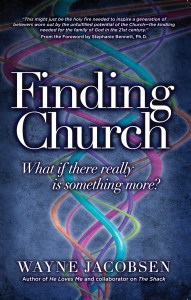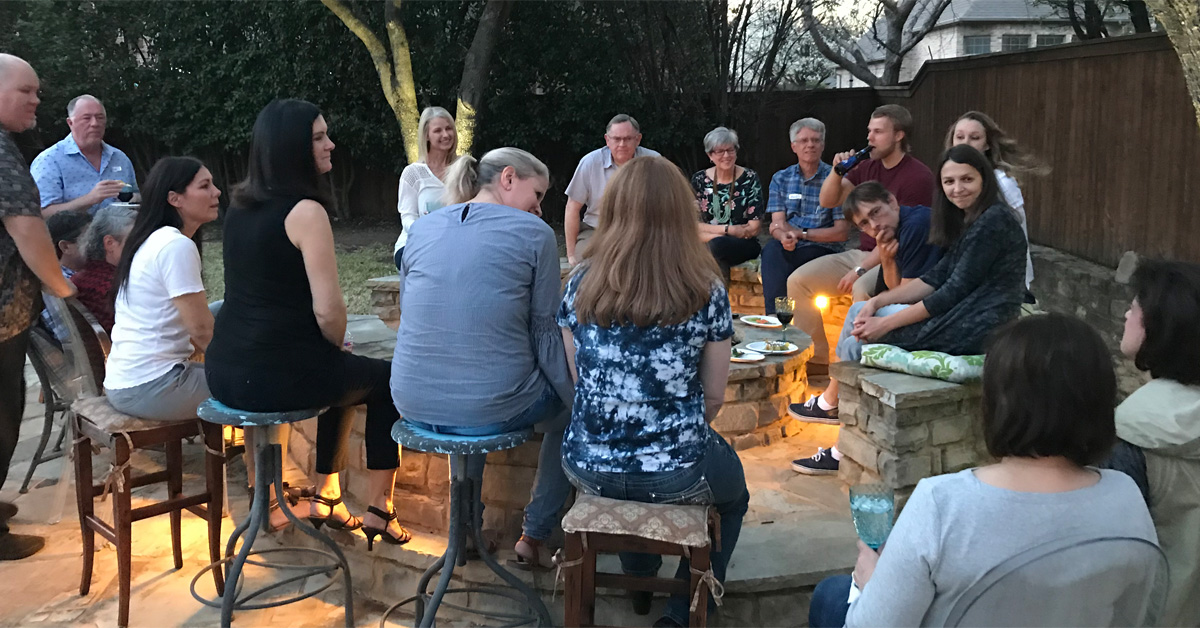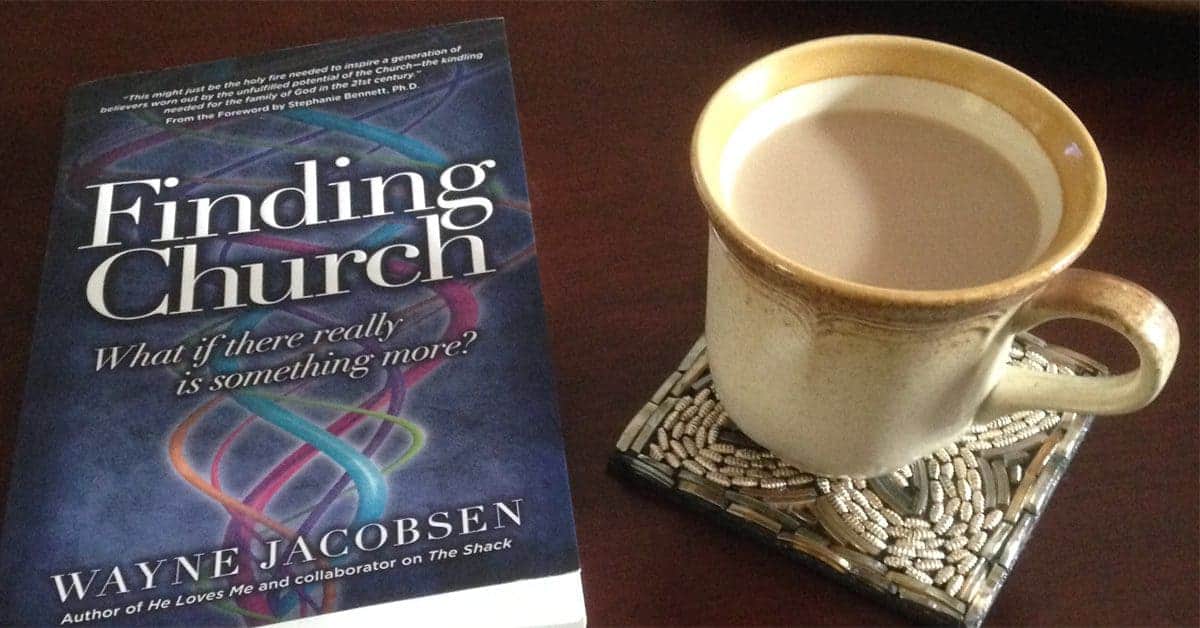Jesus’ church is not a human creation. Rather, it is the fruit of the relationships of those who are part of a new creation—the redeemed race of humanity that relates to him as the head… It’s just that our conformity-based structures cannot produce the internal transformation necessary for the church to take shape among us.
Our way of organizing congregations in the twenty-first century has little in Scripture to commend it. We spend more time making the Scriptures fit our preconceived view of church, rather than deriving our understanding of church from the Scriptures themselves.
Our view of “church life” today has far more to do with institutional identity, meetings, rituals, ethics, and doctrines than demonstrating what a community of Godly love looks like. From that foundation, it is difficult to find our way into the reality of Christ’s church. Maybe he didn’t talk so much about the church because it was not the means to his end. What if he knew it was simply the fruit of his working and that it takes shape quite easily wherever people learn to follow him?
When that longing surfaces either as a hunger for something more real, or as a restlessness that something is wrong, it presents us with a critical moment of choice. Do I stick to the comfort of what I’ve always known or take the risk to follow my heart into a more undefined place? Unfortunately most people will encourage you to suppress your hunger. I’ve talked to hundreds of church leaders who have had similar moments of being pulled between what Scripture invited them to and what they have to do to keep their institutional position. Many have told me they would love to embrace a different reality but can’t figure out how to make it work. With sad and heavy eyes, they’ve turned to me, “I’ve decided just to make the best of what I already have.”
I did that, too, for way too many years, settling into a comfortable, though often lifeless, regimen and ignoring the deeper call of my heart. There were always enough breadcrumbs in the routine to give me enough hope that if we could just find the right alignment all would be well. For a long time I thought it was my fault, knowing how lazy I could be as well as the temptations and motivations that rumbled just beneath the surface. I kept trying harder to be a better person. As genuine as that may seem it always proved a side road back into the swamp of failed self-effort and frustration.
Can you imagine the kind of community that would be unleashed on the world if the people in it were more preoccupied with the realities of Jesus’ kingdom—faith, hope, and love—than they were with their own provision, significance, and power? It would be amazing but it is not something human effort can produce. Our response to the appetites of the flesh and our passion for his kingdom are more visceral. Healing does not come by knowing better and trying harder.
Those growing in a relationship with Jesus, however, don’t share the same angst. They realize the structures of this world cannot accomplish the work of the kingdom and that Jesus’ reality supersedes the things that are valued in this age. Trusting God for their resource, they don’t have to manipulate people for money. Resting in God’s acceptance of their lives, they don’t look for their validation by what others think or say. And, knowing that Jesus gets the last word on everything, they see no need to claim power over others.
This is his to win, not ours to find. I have been winning my granddaughter into my love for nine years now. I didn’t expect her to figure it out on her own or to trust me because I told her so. I convince her by how I treat her. It may be God’s greatest joy to win people into his affection, no less for you than a woman at a well, a greedy tax collector in a tree, or a terrified fisherman who had betrayed him. Love reaches out to the beloved and seeks to win them into a relationship. That’s what courtship is about and hopefully marriage, too. Every day presents more opportunity to win a heart, even if it takes a lifetime.
It may be what John referred to when he said, “We know and rely on the love God has for us.” (I John 4:16) Some translations draw out a deeper meaning: “We have come to know . . . ,” indicating a process. So often our confidence in his love is thwarted by our fears and doubts and circumstances we don’t understand. I love the picture of an older John rejoicing that at last he had “come to know” and “come to rely” on the love God had for him.
I am continually amazed at the places my growing confidence in Father’s love leads me. How great can it grow? I don’t know, but I look forward to each day to discover what new freedom overtakes me and how that leads to treating others differently. Three words help me recognize God’s gravity that replaces the pressures of the world: compassion, trust, and rest. As these emerge from our growing relationship with God, we’ll find it easier to cooperate with God’s working. They are the headwaters that allow us to join the flow of his church.
In the old creation, people tend to be more self-focused: trying to be loved, rather than loving. They are more preoccupied with meetings and activities than they are with sharing friendship. The relationships they do have are mostly task-based, and only last as long as they are working or meeting together. The family way, however, encourages friendships to flourish because people enjoy being together and genuinely care about one another. They share laughter even through difficult circumstances. They serve one another in times of need, and that even extends to strangers in need who cross their paths.
God never intended for us to live in such conflict and isolation. His desire has always been for a world where genuine affection and concern for others replace our selfish ambition. From the beginning it has been his purpose to bring everything that sin separated, including heaven and earth, into one glorious, new whole. He wasn’t the author of conflict or violence, but the one seeking to rescue the creation from its brokenness. His plan was to bring “everything together under Jesus himself.” (Ephesians 1:9-10) Where does that begin? Inside each and every human heart that allows him to begin to untwist the powers of self and shame so that we no longer fall victim to our insecurities. Where we trust his unfolding purpose we will no longer fight for our own, and when his desires become ours we’ll find a growing unity with others who are also living in that new creation. This is the community our hearts long for, a society that lives outside the human need to manage power.
But his temple keeps rising. Each added person only reflects his multifaceted glory with more accuracy and will confound the wisdom of the world by the power of its love and the simplicity of its life. Wherever people are learning to live in his love and love others, the temple rises. Whenever people learn to listen to him instead of the manipulative voices of religious leaders, the temple rises. However people find ways to work together by laying their lives down in kindness and generosity, the temple rises.
In fact, making attendance an obligation may already demonstrate that we’ve lost the vitality of real community and have become mired in mundane rituals, demands for conformity, or internal conflicts that alienate people. Jesus talked about his kingdom being a pearl of great price. If people saw its reality, they would give up anything to be part of it. Living in him and sharing that life with others isn’t drudgery. It fulfills the deepest longings of the human heart.
Everything good does not require a commitment to do what we dislike, but to the simple joy of embracing what we truly love. Obligation presumes that our desires are despicable and lauds those who give up their desires to choose painful tasks for God. But what if your deepest desires are Godly? If he wants your joy to be full then he knows best how to fulfill you. What God identifies as sin are the desires that don’t really belong to us. They have been twisted to offer us immediate gratification or false security, while they lead us down a road to certain destruction— spiritually, relationally, and even physically.
The signal of church life is not easily found in large meetings of like-minded people, but in the engagements of growing friendships. Success is measured not by the size of the group but by the quality of relationships. Instead of complicating people’s time with meetings and commitments, real church life is more readily experienced with authentic friendships in informal settings that don’t require large resources to drive centralized programs.
You can’t share life with hundreds of people sitting in a managed group. You can share a cause, a task even, but relationships won’t grow for the lack of time and energy to explore them. Isn’t that why people feel so disconnected in large congregations and complain that the relationships they do have remain superficial?
A cursory view of history makes it clear that a hierarchy of human leadership does more to disfigure the church than it does to protect it. Perhaps the severest price we’ve paid for doing so is that we no longer see authority resting in Jesus but in the institutions we have created by our own hand—perhaps not so dissimilar from the idols crafted in ancient Israel to replace the God they could not see.
When people who are on a spiritual journey get near each other, the church takes expression. He had no idea what simple joy and life could come out of being together and how fruitful it would be, not only for that week but also for years to come because of the new friendships that were formed. I’ve had the joy of watching a web of relationships grow around the world and see how those connections enrich Christ’s work and allow us to see him more fully.
For that to continue, however, we all have to resist the temptation to throw a structure around it and start monthly, quarterly, or yearly meetings. By doing so we sow the seeds for a new faction in the family and seriously damage the spontaneity of his work by putting a human agenda to it. As excited as I was to be part of this Wicklow gathering a few years ago, I was thrilled that at its end no one pressed to make it a yearly event or formalize a network. There have been other gatherings in other places as people felt inspired to plan and host them, but there has been no attempt to get the same people together at the same place. In fact many on this journey have a hesitation to repeat anything only because it was wonderful the first time, given our propensity to value routine over reality. Tradition is the attempt to get God to repeat something he did once, again and again to the same results. But the breath of the Spirit is too unique for such attempts and we only end up capturing ourselves in routines long after he has moved on.
The power of the church lies in the unity they find together—men and women loving and working together wholeheartedly because they have found their life and joy in him instead of their own preferences and ideas. How could any conformity-based system produce this unity when people are following the expectations of others rather than living out of an ever-expanding heart? Without that, real unity cannot exist. (p. 154)
Jesus didn’t pray for conformity, but a unity that can only arise out of lives transformed by his glory. The answer to this prayer fulfills God’s passion in the earth and by it the world will know that the Father loves us as much as he loves his Jesus. When people out of diverse backgrounds come to complete unity of heart, purpose, and focus, God is unveiled in a way nothing else can accomplish. (p. 155)
That’s why the term leadership is difficult to use inside the new creation. People see it as a management role instead of a gift to help others. So when Paul wrote about elders, overseers, or ministry gifts, he’s talking about those who help others mature, not those who manage institutions. And when we take the words of Hebrews to “Obey your leaders and submit to their authority,” (13:17) and apply them to old creation constructs, we get distorted views of leadership and end up seeking out the wrong people to lead. How often has this Scripture been used by so-called leaders to great harm as a divine sanction for whatever power they wanted to hold over others? Rather than demanding unquestioned submission, the writer was simply appealing to the younger ones to not make it difficult for their older brothers and sisters to help them grow.
So while a local congregation in and of itself cannot fulfill all that Paul promised us about the church Jesus is building, it can be a place where people discover his reality and engage in the kinds of relationships in which his church takes expression. It’s often where people go when they first open to God, and if the teaching is sound, it can provide them with the foundation for a spiritual journey. Corporate expressions of praise and adoration can provide a place for people to engage the transcendent God and opportunities for fellowship can open a door to friendships that can last a lifetime.
However, we’d be less than honest not to wrestle with the fact that their institutional frameworks are remnants of an old creation and thus their priorities are often at odds with the priorities of the new. So while they can facilitate the writing of the creeds to define critical points of theology, an overdependence on them can easily rob people of partaking of God’s mystery as he makes himself known in the course of their daily lives.
You will find the church easiest when you stop looking for an “it,” and simply love the people God has put around you. Start with growing friendships instead of trying to find a group to join. It was no accident that the church began at Pentecost without any strategy or preconceived notion of what it would look like. They weren’t told to start Sunday services or have midweek home groups. They simply did what their new experience with the Gospel and their engagement with his Spirit led them to do. Learn to follow him and then engage others around you with the reality of his kingdom and watch how that bears fruit.
Yes, there is a vast pasture of God’s life and provision to be explored beyond the conformity of our institutions. It is a risk, to be sure, but one with incredible rewards. Perhaps the biggest change is that it forces people to move from being a passive part in someone else’s machine, to someone who actively participates in his unfolding kingdom. You don’t get to follow someone else’s instructions anymore, but instead you have to be more intentional in all aspects of connecting with him and his church.
But those are the sheep I want to romp with in the Father’s care. What can happen out of that simple reality could set a world on fire, just like it did the first time.
Beyond Sundays













